Erstellt am: 6. 3. 2014 - 12:36 Uhr
Schöne Sätze
Quentin Tarantino, Regisseur, über seine Kindheit
Before the age of 10, I was like any other kid. Apart from the fact that I was always considered the most stupid kid at school, the dumbest one in class. I couldn’t keep up with classes, nor keep up with homework. I just couldn’t do it. I couldn’t understand mathematics for example. When it came to school, I never reached the level as anyone else.
(SoFilm)
Judith Holofernes, Musikerin, über ihre Kindheit
Ich war ein literarischer Vielfraß. Habe mir Stapel aus der Bücherei ausgeliehen und gelesen, gelesen, gelesen. Bushaltestellen verpasst, Spaghettigabeln zur Stirn geführt. (Der Standard)
Matthew McConaughey, Schauspieler, über seine aktuelle Rollenwahl
I've said this before, but that's what I've been choosing: Somebody who I could get drunk on their obsessions. Characters that live on the fringe - they're all a little bit on the outskirts of civilization. I find a certain ownership and freedom in that.
(Rolling Stone)
Quentin Tarantino, Regisseur, über seinen Bezug zur Religion
I don’t believe in God. In terms of storytelling, the bible isn’t a book to which I turn as a reference. To me, the bible is the perfect book for any slave owner. If I believe in something it’s the idea of past lives and reincarnation. I never had any funny kind of revelation, but if I had to believe in something, it would be this. I’d really like to know what I would be reincarnated as. Seeing myself in another life would be quite funny.
(SoFilm)
Christian Bale, Schauspieler, über seine physischen Transformationen
Das Körperliche gehört zum Leben, und es liefert viele Informationen. Ich habe sofort ein Bild von Ihnen: Ich sehe Ihren Schal, Ihren Körperbau, die Bartstoppeln... Das ist natürlich nicht alles, Geist und Herz sollten das Wichtigste sein. Aber wenn man zwei Stunden hat, um eine Geschichte zu erzählen, ist der erste Eindruck immens wichtig. (Der Standard)
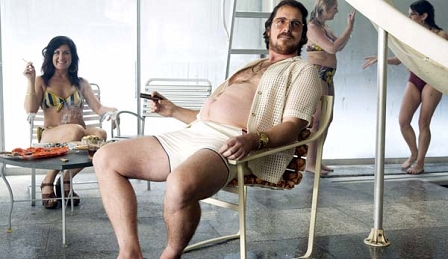
Tobis Film
Das Internet ist an allem Schuld
Bret Easton Ellis, Autor, über seine Verachtung für die Digital Natives (1)
Wenn ich höre, dass Millennials durch „Internet-Mobbing“ verletzt werden oder zum Selbstmord getrieben werden, fällt es mir schwer, das zu verarbeiten. Bei meinem Freund trifft das etwas weniger zu, er ist auch ein Millennial in diesem Alter. Doch selbst er stimmt in die Empfindlichkeit dieser Generation ein. Ihr fällt es sehr schwer, Kritik zu akzeptieren. Deshalb sind viele Inhalte, die diese Generation produziert, beschissen. Wenn jemand für seine Inhalte kritisiert wird, bricht er zusammen. Oder die Person, die die Kritik ausspricht, ist ein Hater, Nonkonformist oder Troll.
(Vice)
Judith Holofernes, Musikerin, ob sie im Tonstudio ihr Handy abschaltet
Auf jeden Fall. Ich bin sogar versucht, mir ein Schriftsteller-Schutzprogramm runterzuladen. Das sperrt das Internet, während man schreibt. Das Netz ist der größte Feind der Kunst.
(Der Standard)
Lukas Moodyson, Regisseur, über das Like-Bedürfnis in der Facebook-Ära
It feels like we’re living in that social, internet culture where people are wanting to be liked, not just on Facebook and Instagram, but in life in general. There’s that scene in Friends, the TV-Series, where they go to a parody of a pretentious theatre, and someone’s screaming onstage „Why don’t you like me?“ We’re living in a culture where everybody’s screaming: „Why don’t you like me?“ If people don’t like you maybe that’s because you have something special that you should be proud of. Maybe. What I’m saying is, it’s a good feeling to be booed offstage.
(SoFilm)
Bret Easton Ellis, Autor, über seine Verachtung für die Digital Natives (2)
In der Generation Weichei und der feigen Prägung der sozialen Medien fließt all das zusammen: Sobald du über irgendetwas abfällig sprichst, bist du ein Mistkerl. Ich finde das problematisch. Es schränkt den Diskurs ein. Worüber willst du noch reden, wenn dir einfach alles gefällt? Darüber, wie toll alles ist? Wie oft ich den Like-Button auf meiner Facebook-Seite geklickt habe? War BuzzFeed die Seite, die keine negativen Kritiken mehr bringen will? Ist das euer Ernst, Leute? Was soll dann mit der Kultur passieren? Und was mit der Konversation? Es wird das Ende sein.
(Vice)
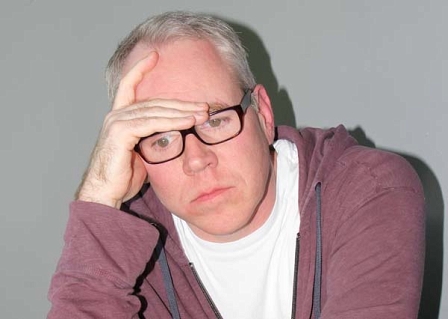
Vice
Jenseits von Gut und Böse
Bret Easton Ellis, Autor, über seine Verachtung für die Digital Natives (3)
In gewisser Weise liegt das an der Generation, die sie erzogen und mit Lob überschüttet hat. Doch irgendwann muss jeder die dunkle Seite des Lebens kennenlernen. Es gibt Leute, die dich nicht mögen, die deine Arbeit nicht mögen, dich nicht lieben... Menschen sterben. Wir haben eine extrem selbstbewusste und positive Generation, die bei dem kleinsten Hauch Dunkelheit, der in ihr Leben eindringt, gelähmt ist.
(Vice)
Martin Scorsese, Regisseur, über die Betrüger und Mörder in seinen Filmen
People do it in war, people do it in business. People do it in love. This is about human weakness. If we don’t recognize it, if we don’t say it exists, it’s not going to go away. The hell with us, we’re old, but what about the young ones. What are we going to do, put some politically correct ribbon over it? No. There is evil in us.
(Deadline)
Gerhard Polt, Multitalent, über Faschismusdarstellungen im Film
Immer in vielen Verfilmungen, wie schon gesagt, das Profil: Hitler – Kippfigur zwischen Dämon und Kaschperl. Es war jedoch Banalität, pure Normalität, nicht einmal schillerndes Mittelmaß, was die Nazioberen und ihre Entourage kennzeichnete. Nicht Brillanz, sondern Mediokrität bemächtigte sich zigtausender Akademiker und anderer gebildeter Menschen sowie Künstler (...) Die Macht der Niveaulosigkeit ist einfach beängstigend.
(Stadtkino Zeitung)
Martin Scorsese, Regisseur, über verstörende Momente in „The Wolf Of Wall Street“
There’s shaving the head of the woman, which is extremely cruel, which brings to mind the humiliation of the collaborators in World War II. There’s the cries of “Wolfie!” – and I hate to say it, but “Wolfie” was Hitler’s nickname. Watch those rallying scenes. Jordan Belfort gave them something to rally around, to be like him. “Wolfie!” made me extremely uncomfortable when they started yelling that in the scenes. No one mentioned it, but I sensed it. It’s mind control.
(The Wrap)
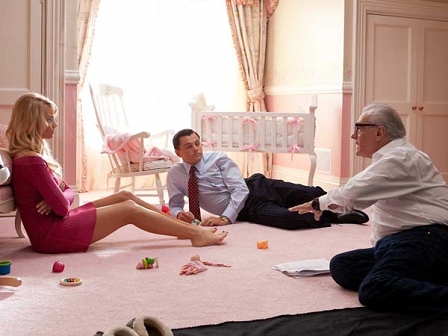
Universal
Die Wölfe tragen Maßanzüge
Martin Scorsese, Regisseur, über die Hauptfigur in „The Wolf Of Wall Street“
All I can show is what he does, and I do not like it. I do not like it. I’m furious with it.
(Deadline)
Bret Easton Ellis, Autor, über „The Wolf Of Wall Street“
Ich mochte ihn, weil er keine Stellungnahme abgab und sich nicht um das kümmerte, worum es heute in so vielen Filmen geht: um Anständigkeit. Um anständige Leute unter Stress oder schweren Umständen. Für mich ist es eine klassische Geschichte über einen jungen Mann, wie Barry Lyndon. In neun von zehn Fällen vergeigen sie es, sie geben ihr ganzes Geld aus, lassen ihren Trieben freien Lauf, bremsen sich nicht, machen sich keine Gedanken um die Zukunft und dann... kracht es. Außerdem fand ich den Film unglaublich komisch und Leonardo war fantastisch. Dass er dieses Jahr keinen Academy Award gewinnt, ist wirklich schade.
(Vice)
Martin Scorsese, Regisseur, über die Message hinter „The Wolf Of Wall Street“
I wanted them to feel like they’d been slapped into recognizing that this behavior has been encouraged in this country, and that it affects business and the world, and everything down to our children and how they’re going to live, and their values in the future.
(Deadline)
Jonah Hill, Schauspieler, über seine Rolle in „The Wolf Of Wall Street“
It’s about downfall, it's about showing that this sort of life leads to a really bad place (...) I remember telling Leo while we were shooting that there will be kids who see this movie and dream of being a stockbroker, but when I watch „Wolf of Wall Street“ now, that's the last thing I want to do, to lead this excessive, wealth-fueled, drug-fueled life. I've seen that excess lead to a really dark place.
(Vulture)
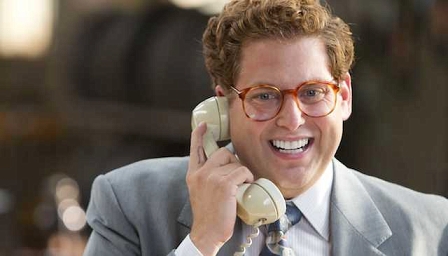
universal
You can’t get no satisfaction
Bret Easton Ellis, Autor, über die Generation X
Du musst verstehen, dass derartige Äußerungen von einem Mitglied der pessimistischsten und ironischsten Generation stammen, die jemals die Erde durchstreift hat (...) Es ist die Schuld der Babyboom-Generation, die ihre Kinder auf der Spitze des Empires aufgezogen hat, in einer kompletten Fantasiewelt. Meine Generation, Gen X, hat gemerkt, dass sie, wie die meisten Fantasien, unbefriedigend war. Wir haben mit Ironie, negativen Einstellungen und Arroganz rebelliert, weil wir den Luxus hatten, es tun zu können. Wir waren in keiner wirtschaftlichen Notlage.
(Vice)
Stacy Martin und Sophie Kennedy Clark, Schauspielerinnen, über ihre Rollen in „Nymphomaniac“ (1)
Clark: The problem with calling „Nymphomaniac“ provocative is that it’s about sex addiction. It’s not sexy. No addiction is.
Martin: The journalists I’ve talked to said they had to redo their questions, because they expected something sexy but they got the opposite. It’s quite ugly and disgusting.
Clark: There’s definitely an ugly side to sex.
(Dazed & Confused)
Thomas Ligotti, Autor, über das Dilemma des Menschseins
We always want something else, something “more.” And then when we get it, we still want something else and something more. There is no place of satisfaction for us. We die with regrets for what we never did and will never have a chance to do. We die with regrets for what we never got and will never get.
(Teeming Brain)
Charlotte Gainsbourg, Schauspielerin, über falsche Erwartungen an "Nymphomaniac"
Ich kann allen, die einen Porno erwarten, nur raten: Gehen Sie nicht in diesen Film. Der Sex darin macht garantiert keinen Spaß.
(Die Welt)
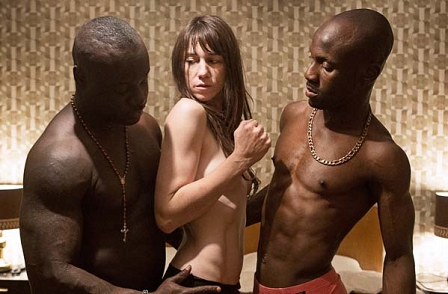
Zentropa Film
Make Love not War
Quentin Tarantino, Regisseur, über seine jugendlichen Schlägereien
I took part in a lot of fights when I was young. I was a fighter, a violent guy. I’m not gonna say that I enjoyed fighting, but I had to deal with a lot of shit, and I tended to use my fists to answer. I liked to throw the first punch. Then my violent character slowly disappeared, between the age of 20 and 30, cause everyone came up to me, so I had to learn to take it on the chin.
(SoFilm)
Christian Bale, Schauspieler, über die Streitereien am Set von „American Hustle“
Die Arbeit wird zum Spaß, wenn sie zufriedenstellt. Manchmal kann es auch die Hölle sein, nur damit es am Ende stimmt. Es gab Zeiten am Set, da haben wir nur gestritten: Bradley Cooper mit Jennifer Lawrence, David und ich, die Crew-Leute... Der Punkt ist: So läuft das im Leben. Am Ende umarmt man sich wieder und sagt: "Ich liebe dich, du Mistkerl!" Ich betrachte es als wunderschönes Durcheinander der Freiheit.
(Der Standard)
Ron Morelli, Labelchef von L.I.E.S.-Records, beschreibt seine Weltsicht
Die Leute sind schrecklich, und sie werden es immer sein. Das ist die traurige Wahrheit seit Anbeginn der Menschheit. Wir werden alle einmal einsam und allein sterben.
(Der Standard)
Nick Cave, Musiker, über sein Bühnenauftreten
When I go out there, I’m not trying to be part of the people. I’m trying to terrify really and dominate.
(Mojo)
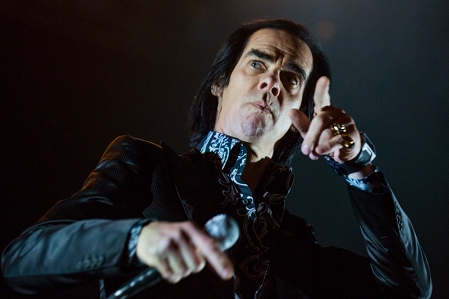
Franz Reiterer
Menschliches, Allzumenschliches
Thomas Ligotti, Autor, über seine Vision einer perfekten Welt (1)
My perfect world would be one in which everyone has experienced the annulment of his or her ego. That is, our consciousness of ourselves as unique individuals would entirely disappear. We would still function as beings that needed the basics - food, shelter, and clothing - but life wouldn’t be any more than that. It wouldn’t need to be. We would be content just to exist. There’s only one problem in this world: none are content with what they have.
(Teeming Brain)
Adelheid Biesecke, Ökonomin, über die Neubewertung von Arbeit
Wenn wir Arbeit sagen, meinen wir Erwerbsarbeit. Arbeit, mit der Geld verdient, Waren und Dienstleistungen für den Markt produziert werden. Alles außerhalb dieses Marktes gilt nicht als Arbeit. Tätigkeiten für die Gesellschaft, Arbeit für die Natur. Die entscheidenden Arbeiten passieren aber außerhalb der Märkte.
(Der Standard)
Thomas Ligotti, Autor, über seine Vision einer perfekten Welt (2)
My own perfect world comes from an amalgam of sources, including Skepticism, Nihilism, Buddhism, and accounts of persons who have actually experienced ego-death (...) Not many people are interested in living in this world, so there is little motivation to work towards it.
(Teeming Brain)
M.I.A., Musikerin, über die menschliche Vielschichtigkeit
Seht her, ein einzelnes menschliches Wesen kann so viel sein, so endlos viel. Eine einzelne Existenz verkörpert so viele verschiedene Facetten und Konzepte und Ideen. Ausufernd! Riesig! Also, wie sollen wir in diese Gesellschaft passen, in der wir nur Arbeiter und Konsumenten sind? Wie soll dieses zweidimensionale Existenzmodell funktionieren? Geld. Kaufen. Verkaufen. Sterben. Ich brauche mehr als das im Leben.
(Musikexpress)

XL Recordings
It’s a men’s world
Stacy Martin und Sophie Kennedy Clark, Schauspielerinnen, über ihre Rollen in „Nymphomaniac“ (2)
Martin: You can film people killing each other, and people are fine with that. But when there’s sex, which we all do.
Clark: The arms go up! Video games are so violent, and people buy them for their children. And yet they won’t talk about sex.
Martin: You can put a lady in a tiny bikini on the cover of a magazine and that’s absolutely fine. But as soon as you say she’s a nymphomaniac, it sparks controversy. We’re hypocrites. People are threatened by female sexuality. We almost never see women strong and determined. It’s amazing that women are finally standing up for themselves.
(Dazed & Confused)
Paul Verhoeven, Regisseur, über Femme-Fatale-Rollen im aktuellen Kino
Today all I can say is that I never see any scripts where the lead is an intelligent and completely diabolical woman.
(SoFilM)
Stacy Martin und Sophie Kennedy Clark, Schauspielerinnen, über Feminismus
Clark: I think ‘feminism’ is still a dirty word. I wouldn’t be embarrassed to describe myself as feminist. Women had to really fight their corner a couple of decades ago, with brute force. It got us where we are. As a result, feminism still has a bit of a stigma. But now we have leeway to behave in different ways and still get heard.
Martin: Feminism is so subjective. Because of the generational divide, and because we’re living in a completely different world than someone in Africa or even Scotland. People like to think of feminists as angry. Clark: Like women who run topless on to catwalks, or Pussy Riot – that’s the feminism that gets into the news. The media rules, and is still very male-dominated. For me, Tilda Swinton flies the flag. Yeah, she’s got an androgynous look, but in her roles she’s very feminine, and she’s so clever with the roles she chooses. I think she’s everything.
(Dazed & Confused)
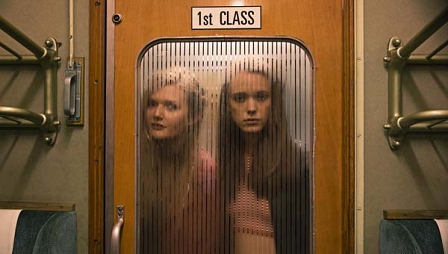
Filmladen
Kunst und Kommerz
Werner Herzog, Regisseur, über sein Problem mit moderner Kunst
„Artist“ is a word I have difficulties with and it’s becoming even more difficult because I distrust art more and more with the passing years, especially over the past twenty years. I’d like to talk about modern art, in quotation marks. It has a dimension that’s very worrisome and extremely disturbing. How can „artists“ allow art what it has become? Values have been totally distorted.
(SoFilm)
Nic Pizzolatto, Erfinder von „True Detective“, über seinen Kunstbegriff
I don’t think art is about expression. I don’t think that’s its primary motive. The primary motivation is communion with your fellow human beings.
(The Daily Beast)
Werner Herzog, Regisseur, über seine liebste Art von Kino
Fred Astaire movies represent one of the essences of cinema. It’s the same with kung-fu films and porno. Fred Astaire, kung-fu, porno and other genres have something I admire because they’re real „movie movies“, the most essential kind of cinema.
(SoFilm)
Andreas Prochaska, Regisseur, über seinen Alpenwestern „Das finstere Tal“
Oberflächlich ist es eine klassische Rachegeschichte, dahinter gibt es andere Schichten. Ich liebe Genrefilme, weil man damit subkutan andere Inhalte übermitteln kann.
(Der Standard)
Ben Wheatley, Regisseur, über den Sinnterror in Drehbüchern
Script books seem to me to be written in a way that it’s like stories written by accountants - everything has to have its place, everything has to mean something, it’s very specific, there should be no ambiguity about what something means, ambiguity is bad, everything wants to be like the Second World War, or Cowboys and Indians, isn’t it? These things are not clear, and life is not like that, it’s much more complex and ambiguous and difficult, and that interests me more.
(Dangerous Minds)
Andreas Prochaska, Regisseur, über seinen Alpenwestern „Das finstere Tal“ (2)
Es ist natürlich auch ein Heimatfilm, du hast eine Umgebung, die den Rocky Mountains um nichts nachsteht und kannst gleichzeitig lokal authentisch bleiben. Das kommt meinen Bedürfnissen, Genre mit starkem lokalauthentischen Bezug zu kreuzen, total entgegen. Heimatfilm heißt ja nicht gleich glückliche Kühe und jodelnde Mägde.
(The Gap)
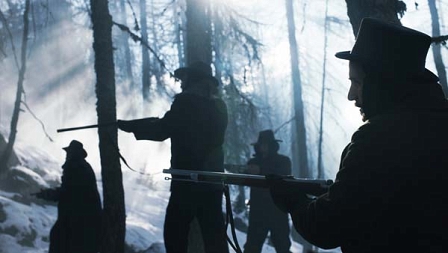
Filmladen
Fernseh-Revolutionen
Nic Pizzolatto, Erfinder von „True Detective“, über den Arbeitsaufwand an der Serie
A couple thousand hours writing, then three months prepping the show for production, rehearsing with the actors, then 6.5 months of 14 hour days filming, then editing the episodes, then doing sound and score. It was eighteen months of my life, and besides the exaltation of finishing and being very proud of the completed product, I did excise a certain amount of personal history and obsession, particularly with the character of Cohle and the things he expresses. He’s something of a metaphysician and as a character he’s extremely close to my heart.
(LitReactor)
Cary Fukunaga, Regisseur von „True Detective“, über den filmischen Ansatz
I pretty much talk about it as an eight-hour film that’s broken into chapters. I never really thought about it as a TV show. I think a TV show has a different kind of constraint. Obviously, a lot of TV shows are based on chronological episode viewing and the stories are contingent upon watching it in order. Syndicated shows you don’t have to watch in order. You’re just watching characters that don’t change that much. So, I considered it more of a complete piece with a beginning, middle and end. At the end, it’s done.
(Collider)
Matthew McConaughey, Schauspieler, über das Neue an „True Detective“
Some of the best drama going on has been on television, in comparison to some films. It was a 450-page film, is what it was. It was also finite. It didn’t mean that we had to come back next year, if we were under contract. In that way, it was exactly a 450-page film script.
(Collider)
Nic Pizzolatto, Erfinder von „True Detective“, über die singuläre Vision hinter der Serie
I just don’t take anything for granted. I made „True Detective“ like it was going to be the only thing I ever made for television. So put in everything and the kitchen sink. Everything (...) It was madness. It was just crazy. I’d work for 48 hours at time and then I’d sleep for 20 hours.
(The Daily Beast)
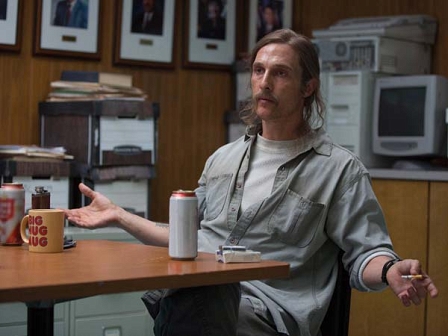
HBO

